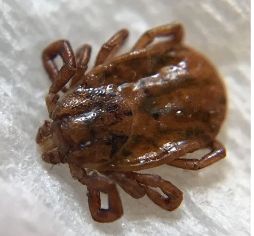
Ticknology laboratory (Fort Collins, CO) has confirmed that a Longhorned tick (Haemaphysalis longicornis) was discovered at a residence in Cherry Hill, New Jersey. This is the first sighting and identification of the Asian longhorned tick in Camden Co.
An adult female Longhorned tick was recovered from a tick bite on August 2, 2019 and was subsequently submitted for identification and pathogen testing at Ticknology. The specimen was initially identified morphologically and then further confirmed by DNA sequencing of the cytochrome c oxidase subunit I gene.
The DNA sequence was compared to all genomic sequences available in National Center for Biotechnology Information databases.
Sequence analysis was performed using a 480 base pair query and the results are as follows:
Organism Score Number of Hits
Haemaphysalis longicornis 887 155
Specimen 2920.1 shared 100% identity with GenBank: MF666915.1, MF666912.1, MF666886.1, MF666885.1, JQ625691.1 and JF758635.1
In an unrelated case, another confirmed female Longhorned tick from Bergen County NJ was also submitted to Ticknology. This specimen was also found attached to a woman on August 12, 2019 at her residence. Both the Camden and Bergen ticks were tested for pathogens and were negative for the following pathogens: Borrelia burgdorferi (sensu lato), Borrelia general species, Borrelia mayonii, Borrelia miyamotoi, Bartonella general species, Anaplasma phagocytophilum, Babesia microti, Rickettsia rickettsii, Rickettsia parkeri, Ehrlichia chaffeensis, Ehrlichia ewingii, Francisella tularensis.
The reporting of human encounters with this exotic tick species in suburban environments further illustrates the need for continued surveillance of the Longhorned tick and its potential threat to both humans and agriculture.
Support passive tick and tick-borne disease surveillance by submitting your tick for identification and testing.
